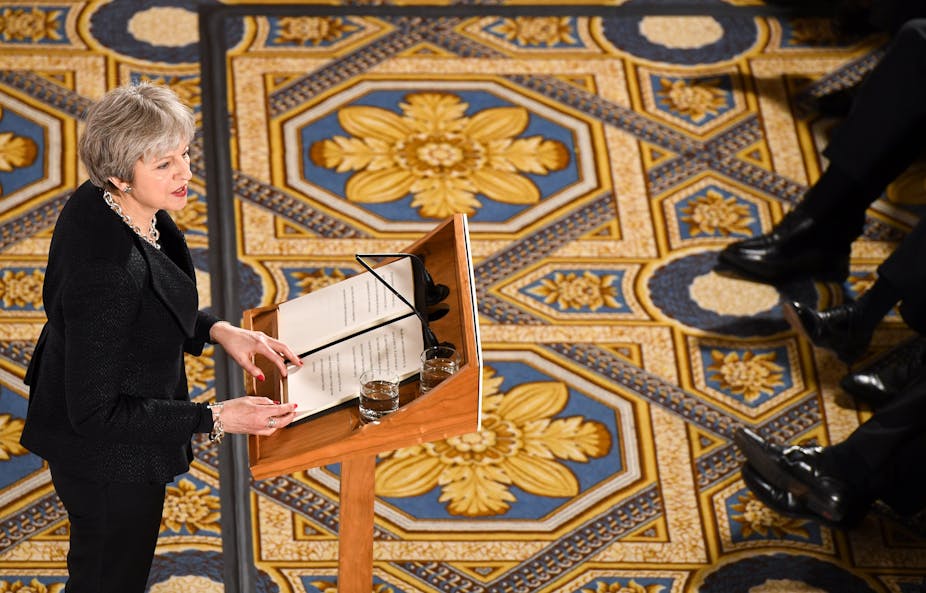With a year to go until the Article 50 process which governs the UK’s departure for leaving the European Union comes to an end on March 29, 2019, much is still to be decided and planned for. While the EU has approved the terms of a post-Brexit transition period, negotiations on elements of the final Withdrawal Agreement are ongoing. One of the principle areas still being discussed is the future of the Irish border.
Key to finding a mutually agreeable way forward on this issue is trust. In the words of the Brexit secretary, David Davis, it’s “a crucial part” of any trade deal for both sides “to trust each other’s regulations and the institutions that enforce them”.
Each side must trust the other to negotiate fairly, and to uphold any potential agreement. For a number of reasons, however, trust is a challenging commodity when it comes to political negotiations.
In philosophy, those who, like me, understand trust and distrust in terms of the commitments that we make to one another, treat this kind of trust – trusting somebody to do something – roughly as follows.
If one person trusts another to do something, the first believes the second is committed to doing it – and that the commitment can be relied upon. For example, suppose that my wife trusts me to pick up our daughter from school. For the commitment theorist, this amounts to her believing that I’ve a commitment to doing it (perhaps I’ve promised), and that if I’m called on to meet that commitment, she can rely on me to do so.
Trust and the Irish border
What this simple analysis of trust helps us to appreciate is that trust will be difficult to generate in dealing with the problem of the Irish border. For one thing, if EU negotiators are to trust the British government to bring forward a clear solution, then they must have a sense of what the British government’s goals and commitments are – and they must be able to rely on them to meet those commitments. Yet, even after UK prime minister, Theresa May, set out more detail of the British post-Brexit strategy in her Mansion House speech in early March, the European Parliament’s Brexit chief Guy Verhofstadt said she had yet to move beyond “vague aspirations”.
Read more: Theresa May's push 'to get on with it' means nothing while rent-a-bile Brexiteers rampage
Even if we zero in and focus on the border problem, it’s not plain sailing. The British government describes itself as having a “commitment that any checks on the UK side will be implemented without recourse to border infrastructure”. That sounds like a commitment to not having a border that includes physical checkpoints. However, as the report goes on to note, some customs checks will be required, and “the nature of the checking and its location is yet to be determined”. The thought is that this will require some kind of frictionless, technologically supported border.
So, we have a sense of the commitments from British politicians. This is progress in developing trust. But the second part of the commitment account of trust that I outlined earlier shows why problems remain.
For EU negotiators to trust the British government to deliver a frictionless border, they would have to consider themselves able to rely on the British government to deliver one. Here the evidence looks thin. As has been widely reported, there are significant questions as to how, exactly, the technology could deliver what’s required. It’s therefore currently a stretch to see exactly how the British government can be trusted to deliver a frictionless border via a technological solution.

Unchartered territory
Of course, there may be hope of a different, non-technological solution, but again we run into a very similar set of issues. It’s anticipated in some quarters that any satisfactory solution would have to be unprecedented and precisely because it would be unprecedented, it’s hard for either party to trust the other to deliver it. How can we be confident that we can rely on someone to do something that’s never been done before? We face a problem of trust once more.
To date, the British government has stated that Northern Ireland will not remain a part of the customs union or single market. However, recent polling suggests that voters in Britain rate leaving the EU as a priority ahead of maintaining the union with Northern Ireland. In the face of that polling data, it’s easy to see why EU negotiators might wonder about the medium-term commitments of the British government.
If voters prioritise leaving the EU over maintaining the union with Northern Ireland, might the government not end up following suit? If the EU negotiators do have such concerns about the British government’s commitments in the face of that polling data, as the commitment account of trust makes clear, this has the potential to undermine trust in the British government’s plans to deliver a solution that preserves the union with Northern Ireland.
We must hope that some trust can be developed on the issue. But, that trust will be hard to come by.

